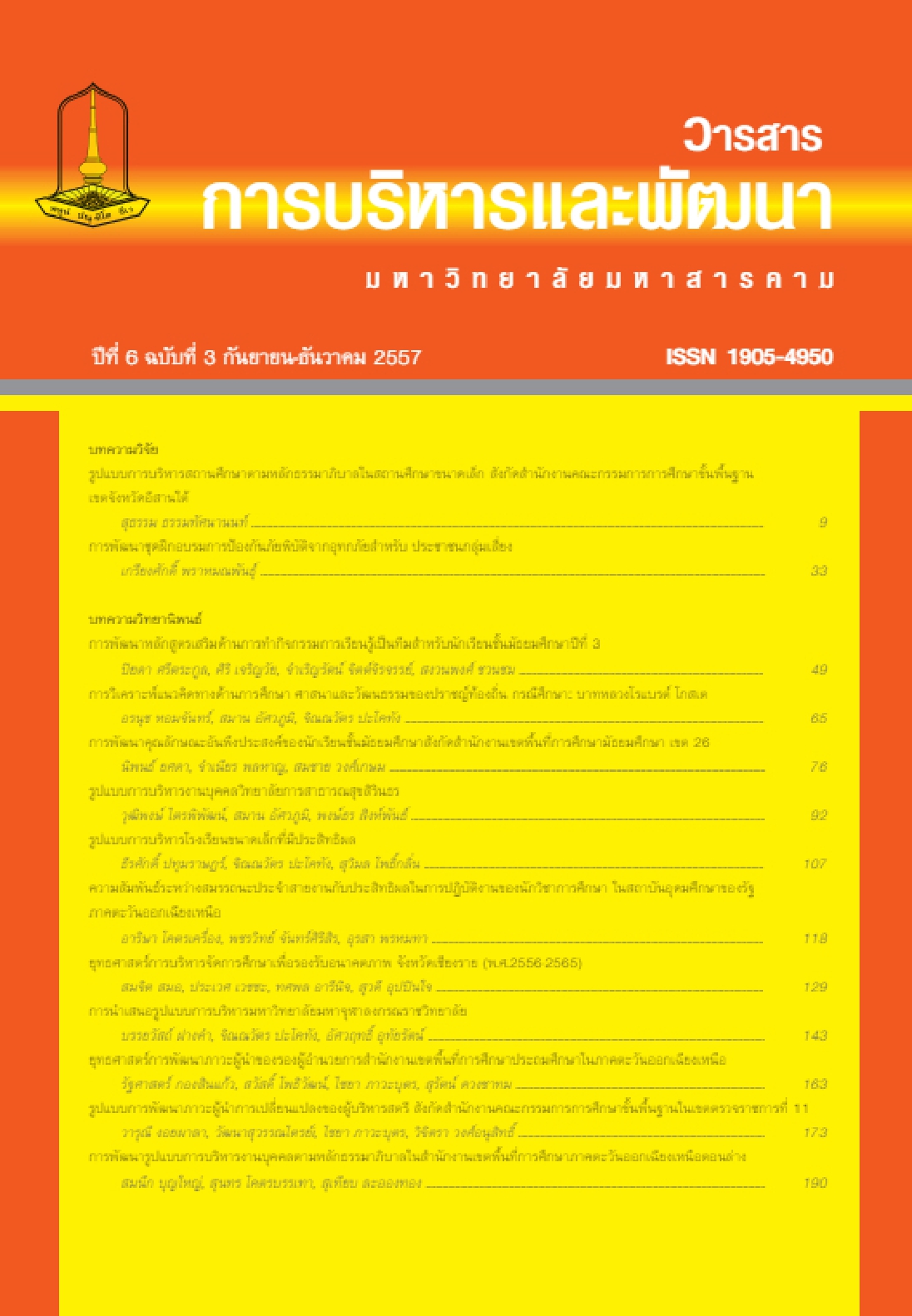The Analysis of Education, Religion and Cultural, Conception of a Local Wisdom: A Case Study of Rev. Fr. Robert Costet
Main Article Content
Abstract
The objectives of this study are to analyze the education, religion and cultural conception of the local wisdom based on a case study of Rev. Fr. Robert Costet. The research was divided into 4 Steps : First step was an in-depth interview concerning Rev. Fr. Robert Costet’s life story, second step was the analysis of his ideas on education, religion and culture which were expressed in his sermons literary work, third step was the approval and certification by 12 experts of focus group panel discussion, and the fourth step was to summarize and present to the 21 experts, the statistics used in data analysis included mean, standard deviation, and content analysis.
The results were as follows:
1. The life history of Rev. Fr. Robert Costet was the Catholic missionary priest from Paris, France, who has been in Ubon Ratchathani, Thailand for 57 years. He lives a simple life and gets along with the Esan people well. He has contributed this experience in Catholic liturgy, his literary work and in his 13 books.
2. The results of the concept analysis on education of Rev. Fr. Robert Costet were as follows: system of education curriculum, indicators, process and sources, and emphasis on content. Teachers had to have responsibility, spirituality of being a teacher and ongoing education. Administrators should have vision, moral qualities, ethic and faith in God. Students were serious on learning and imbued with positive values: humility, sharing, and use their talents to the utmost. Religion aspects consisted of Catholic Christians should practice their faith in liturgy, custom, and teaching. Christians were also missionaries. Culture aspects consisted of exchange and mutual acceptance, which would bring to birth a new culture. This should be passed on from generation to generation.
3. The approval and confirmation of the study by Rev. Fr. Robert Costet himself, people concerned to him and documents, revealed general agreement on three aspects mentioned above, with three recommendations: education, the teachers should have respect for human dignity of the students, and students should invest their time and effort in education. religion, Catholic Christians should express their faith in witness of life and culture. They should respect, learn and accept local cultural values.
4. The presentation of the case study of Rev. Fr. Robert Costet showed the maximal acceptance with added education, aspect education management should meet the standard. Administrator should have concept, theory, and administrative. Teachers should know how to have spirit of love and service. Religion aspect should bring into practice in daily life especially by daily reading the Bible and ecumenism. Culture aspect study contemporary cultures but not too much either direction; learn from each other in order to live harmoniously and happily with one another in Thai society.
Downloads
Article Details
References
Robert Costet. (2006). The history of Christianity spread in Siam and Laos., Bangkok : Assuption printing.
Surapun suwannasri . (2009). A building peacefulness in the social : The education process integration guidelines published Buddhism and Christianity in the Northeast. Mahasarakham University.
Surichai wuenkeaw . (2004) Face cultural globalization : The Policy of the culture in confiscate new ., Bangkok publishers.
Saree Pongpit. (1988).Christianity ., Bangkok, Tammasat university.
Amara Pongsapit . (2001). Culture religion and the ethnic : Analysis Thai social line anthropology ., print time at 5th. Bangkok : Jurarongkron university publishers.
United Nations Organization. Human Development (online) 2013 (cited 9 July 2013). Available from: http://th.wikipedia.org/wiki
Dewey, John. (1916). Democracy and Education ; An Introduction to the Philosophy of Education. New York : The MacMillan Company.


